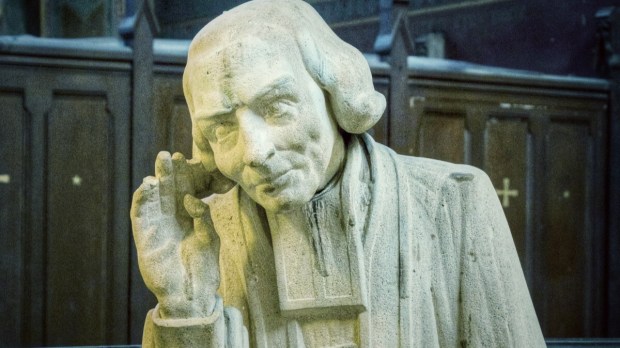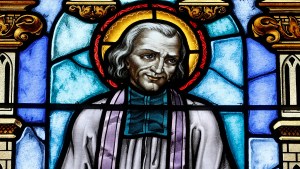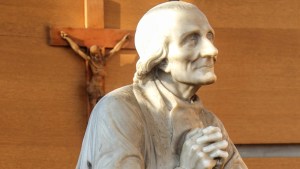St. John Vianney’s parents would wake him in the middle of the night to attend Mass in an isolated barn. He was just a boy. Knowing how much more expansive life feels to a young boy, I assume the midnight Masses were to him like grand adventures. The sleep-eyed animals rustling the stalls, the air thick with hay aloft, a summer breeze bringing in the cool blue night from distant stars like a promise. Perhaps there was a makeshift altar draped in silk and lace. Over it would have gazed Christ himself, hanging from a finely carved crucifix.
The dignified priest and server offered the sacrifice right there on the dirt floor, ringing the bells, whispering the prayers, holding God aloft. There would have been other Catholics quietly gathered with the Vianneys. Maybe he saw friends there, boys his age, fathers and mothers he knew from the village, all kneeling in prayer.
Even if the children didn’t quite understand what was going on, they were participating in a revolutionary act. The French were enduring the anti-Catholic persecutions of the so-called French Revolution, which was actually an atheistic devolution of a culture built up over centuries. The true revolutionaries were the Catholics who steadfastly kept the ancient faith. A revolution is a turning round that brings us back to the beginnings, even as we ourselves are changed by the journey. Families like the Vianneys were circling back to the beginnings of the Church. Their late-night Masses were illegal, but the Church has never bowed to the false gods of politics and empire. In that small barn, even children defied dictators.
This is such a fitting way for St. John Vianney to have been raised, as a child unaware of how profound his actions truly were. All his life, Vianney was underestimated and treated like he was a child. He never minded. All his life, he changed the trajectory of the world, one humble Mass at a time, one brief confession at a time, bending all into his orbit.
Barely passing his seminary exams after many tries, St. John Vianney was finally ordained a priest and assigned as a pastor in the small town of Ars, where his superiors hoped he wouldn’t cause too much damage. Local priests objected and wrote a letter asking to have him removed as unfit. When Vianney accidentally saw the letter, he signed it. too.
Encounter with a shepherd boy
It’s fitting that the first parishioner he met in Ars was a child. One evening in February 1818, Vianney approached his parish for the first time. Antoine Givre, a shepherd boy, saw the priest striding towards him, looking for all the world like a peasant on the path from Lyons. He was pushing a rickety cart holding his meager possessions. He asked the way to Ars. Antoine showed him the village just down the road, dimly visible in the night. “How small it is,” the priest quietly said. When they arrived at the church, Vianney said to the boy, “Thank you for showing me the way to Ars. I will show you the way to Heaven.”
During his long ministry in Ars, Vianney became famous for his catechism classes with children. His lessons were simple but profound. Adults began to stay and listen, too. Soon they were lining up for hours to make confessions to him. People would travel long distances to tell this childlike man their sins.
It was quite the turnaround for a priest who had no particular talent for public speaking, was an indifferent scholar, didn’t care about career advancement, had no expert plans for evangelization, no methods, and certainly no video series or professional techniques for building the Church community. Instead, St. John Vianney simply revealed the paradox of what it means to become like a child.
Those who are childlike are truly wise, while those obsessed with “adult” concerns end up with a shallow understanding and experience of the world. They become childish instead of childlike. St. John Vianney could barely read Latin, but he could read souls.
The childlike and the childish
It’s ironic that a world obsessed with seeming sophisticated has become increasingly banal and childish. Adults dress and act like teenagers. We obsess to an unhealthy degree over sports, entertain ourselves with superhero movies, and eat fast-food for breakfast. Speaking for myself, I can say with certainty that we continue to struggle with the sins of our youth, the same immature, selfish habits that we’ve indulged in ever since we discovered the ego.
Such a world, even as it descends into childishness, is becoming hostile to marriage and especially to children. Kids are uninvited to weddings and scowled at on airplanes. For a couple to have one or two children is considered acceptable, if they must, but any more than that is considered uncouth and environmentally irresponsible. The more we reject the presence of children in our sophisticated, adult world, the more childish we become in all the worst ways.
Vianney, on the other hand, was famously simple and innocent. I wonder how we, too, might unashamedly become more childlike and so grow in wisdom and happiness. He seems to have had a superhuman ability to focus on that which is truly important – God, family, and village. He was never sidetracked by the lure of so-called more sophisticated pursuits. Therein lies his greatness.
Even his vocation to the priesthood was profoundly simple. It happened at one of those secret Masses with his family when he was a boy. Behind locked doors in a private home, he received his first communion. After that Mass, he said, “I will be a priest.” It wasn’t a childish decision. It arose from a deep and abiding love provided in the sacrament. It was a statement of perfect, childlike faith.
Decades later, on August 4 in the year 1859, Vianney died. The very next person to die in Ars was that shepherd boy, Antoine Givre, on the 9th of August. The two did, indeed, travel to Heaven together.



